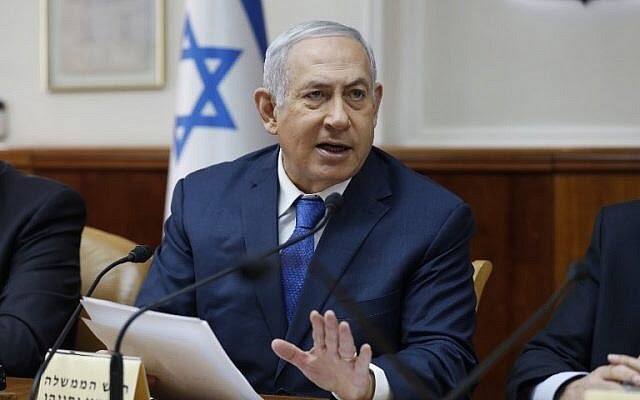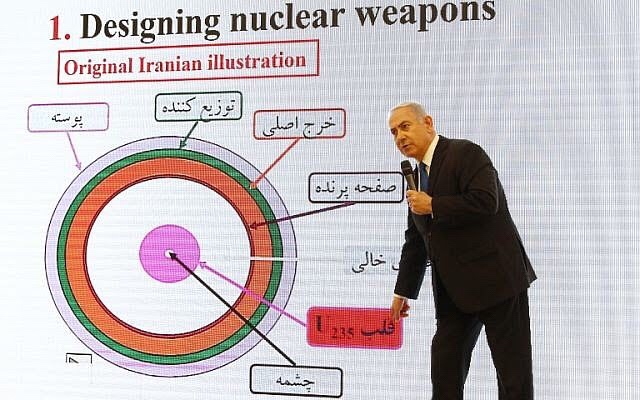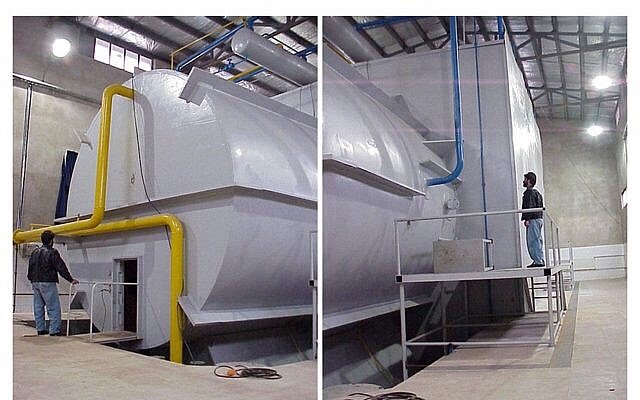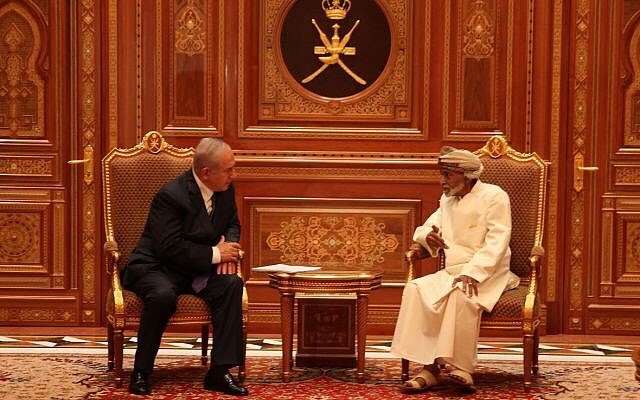 Netanyahu says Israeli agents ‘periodically visit’ Iran to monitor nuke program
Netanyahu says Israeli agents ‘periodically visit’ Iran to monitor nuke programPM tells diplomats: intelligence operatives working to thwart Tehran's nuclear ambitions 'all over the world,' and visit Islamic republic to 'catch up'
By TOI STAFF
16 December 2018, 11:35 pm
Prime Minister Benjamin Netanyahu told a group of diplomats on Sunday that Israeli agents continued to operate inside Iran as part of its efforts to thwart the nuclear ambitions of the Islamic republic.
“We are fighting all over the world in regards to Iran’s nuclear program,” he said at the Ministry of Foreign Affairs headquarters in Jerusalem.
“We also visit there periodically… to ‘catch up,'” Netanyahu added without giving specific details.
Netanyahu was a vocal opponent of the US-led nuclear deal between Iran and Western powers in 2015 that lifted painful economic sanctions against Iran in exchange for curbs on its nuclear program.
The Israeli leader has repeatedly argued that the Obama-era deal will not prevent Iran from acquiring nuclear weapons, after its restrictions expire in the next decade or so. US President Donald Trump, with whom Netanyahu is closely allied, withdrew from the accord in May and reimposed sanctions.

Prime Minister Benjamin Netanyahu gives a speech on files obtained by Israel, which he says prove Iran lied about its nuclear program, at the Defense Ministry in Tel Aviv, on April 30, 2018. (AFP Photo/Jack Guez)
Israel has admitted to covert operations inside Iran to thwart its nuclear program and undermine the agreement.
In April, Israel announced it had smuggled out of Iran more than 100,000 documents from a Tehran archive detailing the country’s nuclear program.
Netanyahu said at the time that the cache proved the Iranian leaders covered up their nuclear weapons program before signing the nuclear agreement. Iran has not acknowledged the alleged seizure.
In September, Netanyahu in his address at the UN General Assembly revealed what he said was a “secret atomic warehouse” outside Tehran, which contained nuclear materials that Iran was not allowed to posses without declaring them to the International Atomic Energy Agency (IAEA).
Both the archive and warehouse, he said in his UN speech, were proof that Iran had not given up its nuclear program.
He accused the IAEA of failing to investigate the cache of documents smuggled out of Iran by Israeli agents, and said he revealed the existence of the Tehran warehouse in an effort to goad the UN’s nuclear watchdog into taking action.

Photographs from the Iranian nuclear weapons archive, showcased by Israeli officials, of a metal chamber that Israeli officials said was housed at the Parchin military site and was built to conduct experiments as part of the Iranians’ rogue nuclear weapons program (Israeli government)
Last month, the Axios news site reported that the Trump administration promised Netanayahu that it would lean on the IAEA to examine the Israeli findings.
US Special Envoy Brian Hook told Israeli officials during a visit in November that the UN agency was “dragging its feet” in its investigation, and vowed that US officials would “work aggressively to make sure the IAEA seriously addresses all information provided by Israel, the US, and other countries regarding the Iranian nuclear program.”
Arab Ties
Netanyahu also addressed Israel’s burgeoning ties with the Arab world that have been largely driven by common fears over Iran.
“I won’t suspend efforts to reach peace with the Arab world until the Palestinians make peace with us. I won’t do it,” he says, describing a process of “normalization” with the region.
“We are going to the [Arab world] and are not subject to the whims of the Palestinians,” he says, repeating hopes that ties with the Arab world will open up new opportunities to reach a deal with the Palestinians.
The Arabs had in the past conditioned any normalization on Israel first reaching a peace deal with the Palestinians.
Netanyahu visited Oman last month and there has been increasing speculation of a breakthrough with Saudi Arabia, amid ongoing behind the scenes cooperation.

Prime Minister Benjamin Netanyahu (L) talks with Sultan Qaboos bin Said in Oman on October 26, 2018 (Courtesy)
He also said Israeli bilateral trade with Turkey is on the rise, despite diplomatic tensions between the two former allies.
No comments:
Post a Comment